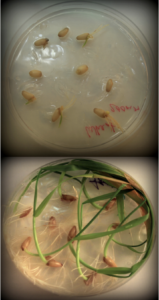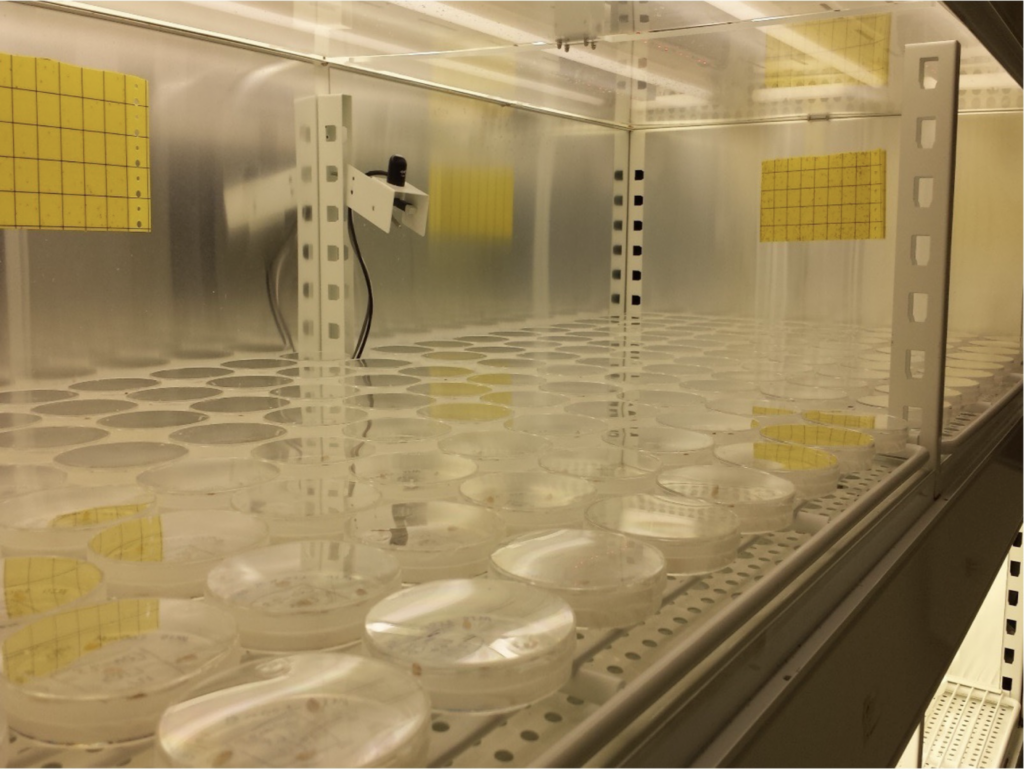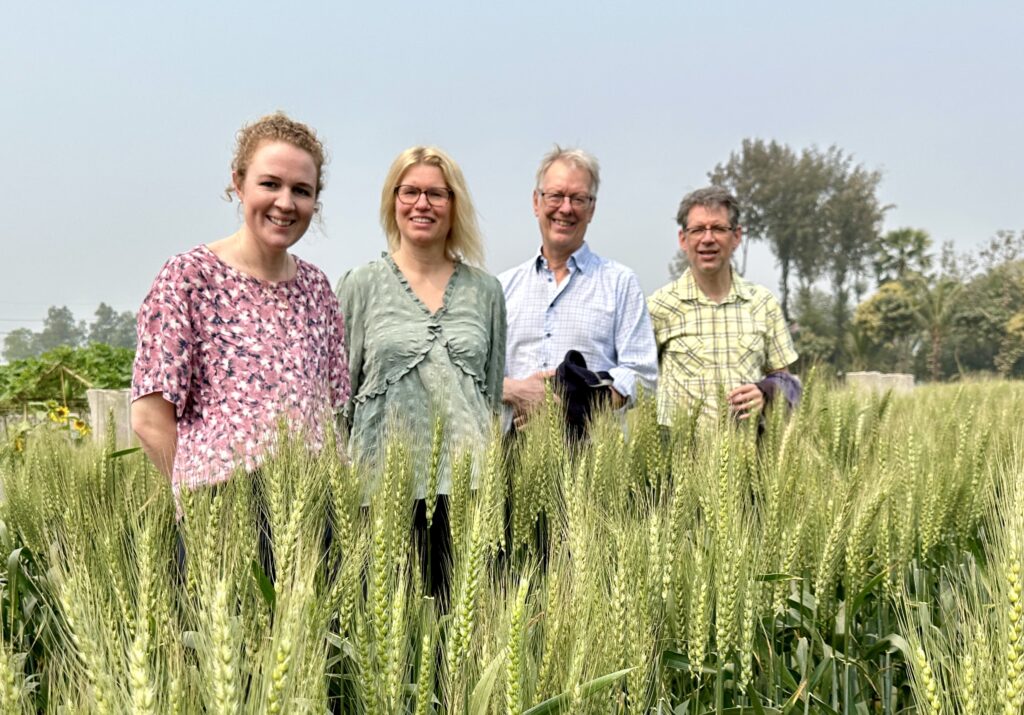The Story of Success highlights innovative regional companies in Plant and Food science, which are bridging the gap between research and industry. In this interview, Olof Olsson, the Research Director and co-founder of OlsAro Crop Biotech AB and professor of Molecular Biology at Lund University, introduces a cutting-edge company that offers solutions to a global growing demand for food. Which techniques are applied? How did the Sweden-Bangladesh collaboration help to solve saline soil problem? Read the interview below!
Please briefly introduce your company.
OlsAro was founded in December 2013 by Olof Olsson, professor of molecular biology, Henrik Aronsson, professor of plant molecular biology and GU Ventures, which is an incubator connected to the University of Gothenburg.
OlsAro´s business idea is based on a mutagenized wheat population with very high genetic variability, from which new wheat varieties with unique properties can be developed. At present, OlsAro´s focus is on different abiotic stress applications, i.e. to develop primarily wheat with increased salt-, heat- and drought tolerance, since these are very important characteristics that will contribute to food security in a changing climate.
What was your motivation for starting the company?

OA-lines germinating on 200 mM NaCl (bottom). Original control wheat (top).
In the spring of 2012, when I was still at the University of Gothenburg, I was contacted by a researcher from Bangladesh who was a postdoc in Henrik Aronsson’s group. He told me about the serious problems they had with saline soils in his country. During that time, I was active in a company, CropTailor, that I co-founded, where we developed new oat varieties. The basis was an oat mutagenized population that was produced in my research group a few years earlier. Obviously, a salt-tolerant crop, preferably wheat, would be a tremendous asset in saline areas. Since we had the mutagenesis technology already set up, why not develop a wheat population especially targeted for Bangladesh? We contacted the Bangladesh Agricultural Research Institute (BARI), and in a dialogue with BARI, we identified the best Bangladesh wheat variety at the time. Meantime, I moved to Lund University, where we continued the project by developing a mutagenized population from the best locally adapted Bangladesh variety at the time by introducing ca 500,000 chemical random mutations in each of thousands of seeds. From these seeds, we then produced a population of more than 2,000 mutated lines. In collaboration with Henrik Aronsson at Gothenburg University, we developed a salt screening assay and used this to screen the whole population for saline tolerance. The concept worked very well, and we could identify more than 70 lines carrying mutations that enabled them to grow on 200 mM NaCl. This is a very high level, which kills most plants, including the wheat variety we started from. These results looked so promising that Henrik and I decided to establish a new company to facilitate further development, practical application and commercialization of saline crops. GU Ventures liked the concept and joined us at this point.
Can you tell us more about the technologies OlsAro AB uses?
Chemical mutagenesis, advanced biochemical and genetic screening methods, phenotyping in very controlled greenhouse conditions (phytotrons), advanced bioinformatics, gene editing, database building, AI accelerated genomic screenings and testing of promising lines in the field. By now, we have performed field tests in several countries besides Bangladesh, like Pakistan and Kenya, and we have several more countries in the pipeline. From these trials, five superior lines (OA-lines) have come out so far, with the strongest one showing, on average, a 52% higher yield on saline soils than the best local lines, based on three years of field trials.
What makes you different from other companies in your sector? What novelty do you bring?
Our OlsAro proprietary tech platform enables us to be a trait developer for both additional traits and additional crops. Looking specifically at salt tolerance, our uniqueness is that we already have developed unique salt-tolerant lines, that, in addition, are classified as non-GMO. Not only do they have a proven value in saline areas, but they also provide an excellent scientific model system to study the mechanism of abiotic stress tolerance at the molecular level. Up to now, we have obtained full genomic sequences of 20 OA-lines as well as the original Bangladesh variety. By using advanced bioinformatics, machine learning, AI-based applications and various gene mapping methods in combination with advanced phenotyping, we are now in the process of identifying different genes that encode stress-tolerant activities.

Screening for salt-tolerant wheat line.
What type of market are you targeting?
OlsAro´s customers are primarily seed companies. Through such partnerships, we can take advantage of already-established channels to distribute our improved seeds to farmers in saline areas. We have a long-term contract for the Bangladesh market with Lal Teer Seeds Limited. Lal Teer is headquartered in Dhaka, and through their networks, we reach more than 10 million farmers. Our first focus is to enable cultivation on salt-contaminated land that presently lies fallow under the winter season (1 million hectares only in Bangladesh). Thus, we will not compete with existing cultivations during the two other growth seasons, but instead add an extra growing season in the winter when the soil is to saline to grow any other cash crop! Presently, the best OA-lines are being DUS tested, a necessary step prior to commercialization. Once approved, the OA-varieties will be propagated and cultivated not only in Bangladesh, but several other countries.
We are also in the process of developing genetic markers for various abiotic stress pathways, which will facilitate the breeding of salt tolerance in crops other than wheat. Such markers will be patented and introduced into elite varieties around the world by means of gene editing.
Where are you now, and where will your company be in 5 and 15 years?
Today, the company is run by the CEO, two full-time employees and the founders. There is a high demand for climate-adapted crops in future agriculture. In 5 years, our salt tolerant lines have been developed to OA- varieties that are sold and cultivated not only in saline soils in Bangladesh but also in additional countries such as Pakistan and Oman. Globally, hundreds of million hectares of soil is salt contaminated, so the potential market is enormous. During the next years, our technology will be expanded not only to other wheat varieties but also to crops like rice and maize. Additional traits like heat- and drought tolerance, more efficient uptake of nitrogen and other nutrients as well as seeds with higher nutritional values will also be developed. We have already started up R&D activities on such additional traits. In 15 years, we expect to be a major global seed provider.

OlsAro AB team: Elén Faxö, Sofia Ström, Olof Olsson, Henrik Aronsson.
Thank you for a very interesting interview, Olof! We wish you and OlsAro AB all the best in your future endeavours!
(Photo: Olof Olsson)

